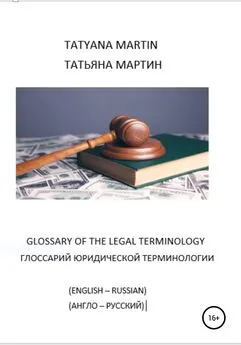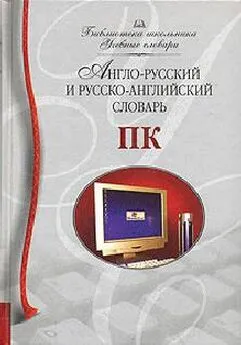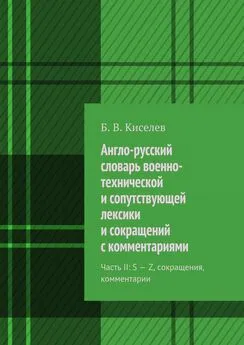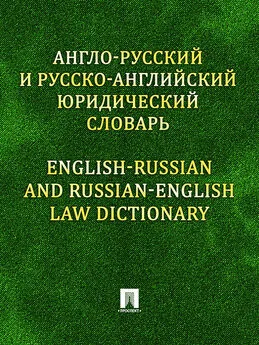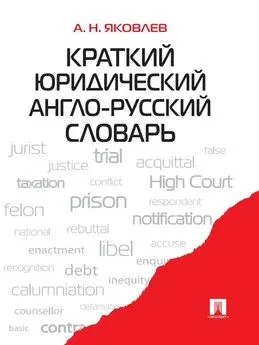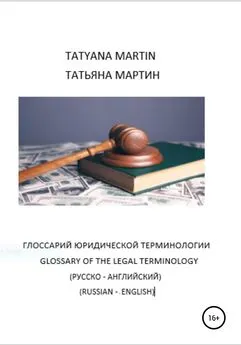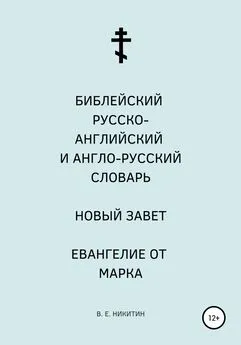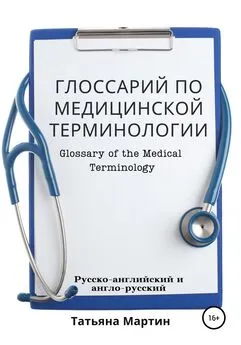Татьяна Мартин - Глоссарий юридической терминологии (англо-русский)
- Название:Глоссарий юридической терминологии (англо-русский)
- Автор:
- Жанр:
- Издательство:неизвестно
- Год:2022
- ISBN:нет данных
- Рейтинг:
- Избранное:Добавить в избранное
-
Отзывы:
-
Ваша оценка:
Татьяна Мартин - Глоссарий юридической терминологии (англо-русский) краткое содержание
In the glossary of legal terminology presented to your attention, the author provides legal terms in English and Russian and their brief description of individual sections of the legal system (Anglo-Saxon and Roman law). In the glossary, the terms are presented in Latin alphabetical order. The glossary will be useful for law-related workers, people engaged in translations of legal literature, and for the general public.
Глоссарий юридической терминологии (англо-русский) - читать онлайн бесплатно ознакомительный отрывок
Интервал:
Закладка:
Татьяна Мартин
Глоссарий юридической терминологии (англо-русский)
The glossary of legal terminology presented to your attention contains legal terms in two languages English and Russian, and a brief description. In the glossary, the terms are presented in Latin alphabetical order. The glossary will be helpful for law-related workers, people engaged in legal literature translations, and the general public.
The glossary discusses terms in the following sections of the legal system:
1. Judicial systems and jurisdiction
2. The procedure of criminal proceedings
3. Civil litigation.
4. Stages of the trial
5. Preliminary hearing and jury trial
6. Legal ethics
7. Constitutional law
8. Crimes against the person, property, and human habitation
9. Offenses and causing harm. Intentional offenses. Murder,
10. Crimes against morality and drug abuse
11. Negligence and liability
12. Conclusion of contracts. Contract requirements. Third parties and contract execution
13. Unified Commercial Code and contracts for the sale of goods
14. Personal property and liens. Intellectual property
15. Wills. The main provisions of the will and essential reservations and instructions.
16. Disinheritance. Revocation of the will, expiration, and exceptions.
17. Absence of a will. A personal representative of the property. Agency law
18. Settlement of property status. Acquisition of ownership of the real estate. Multiple ownership of the real estate
19. Mortgage loans. Landlord and tenant
20. The procedure of marriage and divorce
21. Commercial organizations. Bankruptcy Law
22. U.S. Immigration and Naturalization Service (INS)
The difficulty of translating terms lies in different legal systems in English-speaking countries and the Russian Federation. Therefore, it is sometimes difficult to find similar legal terms in these legal systems, and some terms were described by direct translation from one language to another.
The leading legal systems in named countries are the Anglo-Saxon and Romano-Germanic legal systems. The most critical differences in the Anglo-Saxon and Romano-Germanic law systems are that the Anglo-Saxon system of law is based on judicial precedents. In contrast, the Romano-Germanic system is based on normative legal acts. Anglo-Saxon law is not divided into public and private (Anglo-Saxon law does not have a structure of clarity and systematicity, unlike the Romano-Germanic legal system).
English law is the legal system of England and most of the states of the British Commonwealth of Nations and the United States. English law can be divided into two inextricably linked branches: general (or case law) and the law of statutes – acts of Parliament.
The essence of English common law is that the courts create it. Thus, in the course of hearings, based on the principle of stare decisis ("strictly adhering to what was decided earlier"), apply legal precedents to the facts and circumstances of each particular trial. The degree of legal force of judicial decisions depends on the court's position in the hierarchy of the judicial system. The hierarchy's highest court of appeal decisions is a binding legal precedent for application by lower courts.
Statutes are a codified reflection of case law since they are sets of rules from judicial precedents. The Parliament only has to bring the process to a logical conclusion by adopting the so-called "acts on legal reforms," amending the existing statutes, and formalizing the already actively applied law norms.
In English law, the following main branches are distinguished: Constitutional Law, Administrative Law, Family Law, Tort Law, Contract Law (in Business), Property Law, Trusts, Labor Law, Evidentiary Law, Criminal Law.
English law distinguishes the following types of law: common law and the law of equity, and also public and private law. The distinction between civil and criminal liability is central to English law – the procedure for judicial protection and terminology depends on it. The critical difference between public and personal law is who triggers the mechanisms of official coercion: the state or an individual. In the field of business, private law is most applicable, especially corporate law.
Criminal law is part of public law. A private person does not pursue the criminal, but by the state, because society as a whole suffers from the crime – the scale of the harmfulness of the consequences is used to explain why the same act can entail both criminal and civil liability (for example, drunk driving with a downed pedestrian entails both criminal prosecutions for threatening the whole society with drunk driving and civil liability for harming the health of an individual). To find the defendant guilty, the public prosecutor must prove that the actions or omissions had socially dangerous consequences or that the defendant failed to fulfill the obligation to take all necessary measures to avoid criminally punishable consequences.
Civil law is an element of private law. The names of civil cases reflect the fact that a private person initiated the coercion. The plaintiff must convince the court that the veracity of his statements is more likely than improbable (the principle of greater probability). Civil liability is not a punishment but serves as compensation. Therefore, for example, debt collection in civil proceedings cannot entail restriction of the debtor's freedom (hence, in a comparative legal context, the Russian practice of prohibiting the departure of civil debtors abroad looks doubtful). The dispute may be settled out of court at the discretion of the parties. In the field of civil legal relations, the law of justice is most often applied.
An essential difference between the American legal system and the English one is the presence of a written Basic Law, which in the country is the Constitution of September 17, 1787, consisting of a preamble, seven articles, and twenty-seven amendments. English case law is not applied unconditionally.
The Romano-Germanic legal family includes the legal systems of Western, Central, and Southern Europe and the Russian Federation. The main feature of the Romano-Germanic legal system is its formation based on the reception of Roman law. An essential element of Romano-Germanic law is its pronounced codification character. The main source of law is the law (normative legal act). It has a clear sectoral division of legal norms.
The historical feature of Romano-Germanic law is the elevated status of private law relative to public law; that is, the principle of the importance of personal law and the secondary nature of public law is observed. The concept of a legal norm is one of the most important elements of Romano-Germanic law. The understanding of the legal norm boils down to the following: the rule of law is a rule of conduct that is general and generally binding, is of great importance. The legal norm is considered an abstract order, as the highest rule of behavior for citizens and state bodies. Normative legal acts, as a rule, are constructed according to the following hierarchical scheme: constitutional (organic) laws – ordinary (current) laws – by-laws. The leading role in lawmaking belongs to the legislator, as a rule, to a representative body of state power; the prevailing legal doctrine is the doctrine of the rule of law. Firstly, it means that the law has the highest legal force, and all other normative legal acts must be brought into line with the law, and in case of contradiction of the law, any act can be protested or canceled. Secondly, under the doctrine of the rule of law, the law enforcement officer is obliged to act strictly under the law, without creating new legal norms.
The sources of law in the Russian Federation are the Constitution, federal constitutional laws, federal laws, presidential decrees and orders, Government resolutions and orders, departmental acts of federal executive authorities, constitutions (charters) of subjects of the Russian Federation, laws of subjects of the Russian Federation, acts of executive authorities of subjects of the Russian Federation, acts of local self-government bodies; also, international treaties and agreements, if they have been duly ratified, are sources of law.
Russia's legal system is a combination of the national system of law and international legal obligations of the Russian Federation, the legal culture of Russian society, and legal practice in Russia. In the Russian legal system, it is traditionally possible to distinguish: constitutional (state) law, civil law, administrative law, criminal law, civil procedure law, criminal procedure law, agricultural law, land law, labor law, family law, financial law.
В представляемом вашему вниманию глоссарии по юридической терминологии приводятся юридические термины на двух языках английском и русском, и подается их краткое описание. В глоссарии термины подаются в латинском алфавитном порядке . Глоссарий будет полезен для работников, связанных с юриспруденцией, людей, занимающихся переводами юридической литературы и для широкой публики.
В глоссарии рассмотрены термины по следующим разделам правовой системы:
1. Судебные системы и юрисдикция
2. Процедура уголовного судопроизводства
3. Гражданский судебный процесс.
4. Этапы судебного разбирательства
5. Предварительное слушание и суд присяжных
6. Юридическая этика
7. Конституционное право
8. Преступления против личности, собственности и человеческого жилья
9. Правонарушения и причинение вреда. Умышленные правонарушения. Убийство,
10. Преступления против нравственности и злоупотребление наркотиками
11. Халатность и ответственность
12. Заключение договоров. Требования контракта. Третьи стороны и исполнение контрактов
13. Единый Коммерческий кодекс и договоры купли-продажи товаров
14. Личное имущество и залоги. Интеллектуальная собственность
15. Завещания. Основные положения завещания и важные оговорки и указания.
16. Лишение наследства. Отзыв завещания, истечение срока действия и исключения.
17. Отсутствие завещания. Личный представитель имущества. Агентское право
18. Урегулирование имущественного положения. Приобретение права собственности на недвижимость. Множественное владение недвижимостью
Читать дальшеИнтервал:
Закладка:
